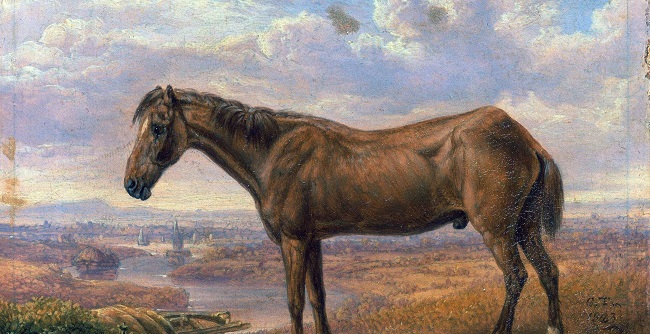“Old Billy,” an English draft horse that died at the age of 62, is the longest living horse according to the Guinness Book of World Records. Although most horse owners know their hoofed friends probably will not make it into the record books for longevity, with a little TLC geriatric horses can live a happy and fulfilling life.

Most horses geriatric by 20, although old is a relative term depending upon the use of the horse. For example, racehorses are old by age five or six, but for a hunter jumper that is still young. Just as with humans, there is no age at which retirement should be mandatory. Regular exercise is the best thing for horses that are sound enough to do so. Pay attention to how your horse feels when exercised. If it still has the ability and the heart to canter you around, then don’t let its age make you say “whoa!”
While one of the common signs of aging in humans is graying of the hair, horses needn’t worry about dying their dreads as they age. Horses do “grey,” but this phrase is most often used in the equine world regarding a young horse that was born black or brown and is now in the process of turning white. As many horse breeders will tell you, white horses (technically called “grey” if their underlying skin is not pink) are never born white. So, in contrast to humans, a greying horse is usually a young one.
Although horses do not share many of the aesthetic aging concerns that humans do, there is one universal problem. Arthritis is very common in older horses. Although we cannot give our 1200-pound equine friends a walker or a wheelchair, we can ease their pain with good management practices and certain medications. For minor arthritis, medications can be injected into the muscle or joint space. Also, “keeping a horse out in a paddock or pasture is better than keeping them in a stall. The more the horse can move around, the healthier its joints will be.
Owners often wonder when and if they need to feed a senior diet. But if a horse can still chew well, high-quality roughage should be offered. As for switching to a specific senior diet, older horses with dental concerns and those who can no longer maintain a healthy body weight on roughage should be transitioned to a senior feed. One of the most common reasons for weight loss in horses is because a horse’s teeth either become extremely worn down or a tooth falls out and the opposing one overgrows. As always, contact your veterinarian for information.
Related Articles & Free Email Newsletter Sign Up
DIY Nutritional Supplements & Health Care for Horses
How to Use Kindness for Effective Horse Training




Comment here